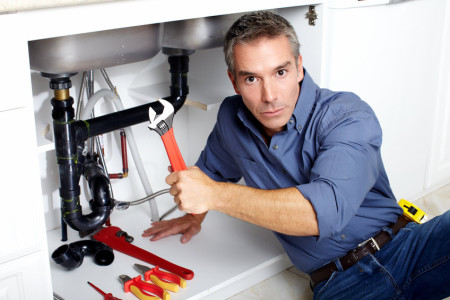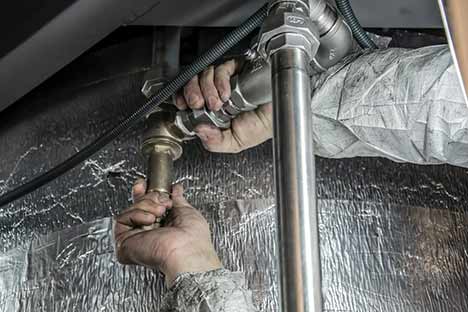This article down below pertaining to What to Do During a Plumbing Emergency is really remarkable. You should investigate it.

Pipes emergency situations can strike at any moment, causing stress and prospective damages to your home. Whether it's a ruptured pipe, a blocked drain, or a leaking faucet, understanding just how to take care of the circumstance till a specialist plumber shows up can save you from additional difficulties. This write-up supplies important emergency pipes tips to help you reduce damage and reclaim control throughout a plumbing situation.
Switch off the Water System
The very first step in any plumbing emergency situation is to shut down the water system. For localized issues, such as a dripping faucet or toilet, shut off the valve near the component. When it comes to a significant leak or ruptured pipeline, situate your home's primary water shut-off shutoff and turn it off instantly. Understanding the place of these shutoffs beforehand can save useful time throughout an emergency situation.
Shut Off Your Water Heater
In specific emergency situations, such as a ruptured pipeline, it's important to shut down your water heater. This avoids overheating or damage to the system when water quits moving. Switch off the power supply to the hot water heater (electrical or gas) and let it cool off to stay clear of possible threats.
Temporarily Stop a Burst Pipe
A burst pipe can cause substantial water damages in mins. To mitigate the issue:
- Clamp or Wrap the Pipe: Use a pipe clamp, rubber, or duct tape as a temporary seal.
- Divert Water Flow: If possible, divert the water into a bucket or basin to limit damages to bordering locations.
- Maintain the Location Dry: Usage towels or a wet/dry vacuum cleaner to get rid of standing water.
- Call a specialist plumbing instantly to attend to the trouble completely.
Have an Emergency Situation Pipes Package
Prepare a basic plumbing emergency package to take care of small concerns effectively. Your kit must consist of: - Flexible wrench
- Plumbing professional's tape
- Pipeline secures
- Towels and dustcloths
- A bettor
- Epoxy putty
- Pail.
- Having these tools available can make a considerable difference in your capability to take care of emergencies.
Unclog Drains Securely.
A clogged up drainpipe can be an irritating and messy problem. Here's just how to tackle it:. - Use a Bettor: For sinks or bathrooms, a plunger can often displace small blockages. Ensure you use the appropriate sort of bettor for the component.
- Hot Water and Recipe Soap: For grease-related clogs, pour a blend of warm water and dish soap away to separate the oil.
- Avoid Chemical Drainpipe Cleaners: While tempting, chemical cleansers can trigger even more injury than excellent, especially to older pipes.
- If these techniques don't function, prevent utilizing excessive force, as it may aggravate the blockage.
Handle Overflowing Toilets.
An overruning commode can create prompt disorder. Below's what you ought to do:. - Quit the Water Circulation: Eliminate the storage tank cover and press down on the flapper valve to stop water from entering the bowl. Turn off the supply of water to the bathroom if essential.
- Dive Carefully: Utilize a bathroom plunger to get rid of the clog, yet prevent aggressive plunging, which can cause spilling or additional damage.
- Have the Spill: Usage towels or a wipe to tidy up water quickly to stop floor covering damage.
Address Tiny Leaks with Short-term Solutions.
Little leaks can quickly end up being significant issues if left unchecked. Utilize these short-term solutions up until specialist assistance shows up:.
- Pipe Tape or Epoxy Putty: Use water-proof tape or epoxy putty to briefly secure the leak.
- Rubber and Clamp Approach: Wrap an item of rubber or an old inner tube around the leakage and protect it with a hose clamp or air duct tape.
- Buckets or Towels: Area buckets under the leakage to include water and prevent damage to floor covering or furniture.
- While these solutions aren't permanent, they can help lessen water loss and damage.
Take Care Of Frozen Piping Thoroughly.
In cooler environments, frozen pipelines are a typical emergency situation. If you suspect a frozen pipeline:. - Shut off the Water: Turn off the main supply of water to prevent a ruptured pipeline.
- Thaw Gradually: Use a hairdryer, heating pad, or cozy towels to thaw the pipe slowly. Stay clear of open flames or extreme warmth, as these can harm the pipe.
- Check for Leaks: Once the pipe is defrosted, look for fractures or leaks before transforming the water back on.
Know When to Call an Expert.
While quick fixes can aid temporarily, certain plumbing issues require prompt expert focus. Call a plumbing technician if:.
- A ruptured pipeline causes comprehensive flooding.
- Drains pipes or bathrooms continue to be stopped up despite your efforts.
- You observe consistent leakages or water stress problems.
- Your water heater is dripping or malfunctioning.
- Without delay calling a specialist guarantees the issue is fixed appropriately and prevents more issues.
Protect against Further Damages.
Taking quick action to reduce damages can conserve you money and time over time. Here's how:. - Relocate Valuables: Eliminate furniture, electronics, and other items from the afflicted location.
- Use Sandbags: For flooding scenarios, area sandbags around the area to redirect water.
- Shut down Electrical power: If water has reached electrical outlets or appliances, shut off the electricity to stop shocks or fires.
Verdict.
Pipes emergency situations can be overwhelming, however with the ideal understanding and devices, you can take care of the scenario effectively till help shows up. By switching off the water, attending to small leaks, and making use of temporary fixes, you can reduce damages and maintain your home safe. Keep in mind, these suggestions are short-lived solutions; always seek advice from a qualified plumbing technician to manage the root cause of the problem. Preparation and quick thinking are your finest allies in any type of plumbing emergency situation.
8 Helpful Tips for Managing Plumbing Emergencies at Home
If your plumbing system hasn’t failed once, wait for it because almost everyone has a story to tell. Sometimes, it could be simple emergencies such as a leaking pipe, a blocked cistern, or even a big burst pipe. In situations like this, you need to have some handy tips to save you some money and from possible damages.
Take care of minor issues early.
Sometimes, you could have avoided an emergency by taking proactive measures while it was still early. Some major plumbing emergencies can be a result of an ignored minor issue. We recommend that you have items like plumbing tapes and other related items. A plumbing tape can allow you to manage minor leaks before the plumber arrives.
Cut off the water supply.
This tip is essential in almost any type of leakage problem. For problems like minor leakages in the toilet or kitchen, turn off the supply that takes water to the affected pipes. If the leakage is a major pipe, you must shut off the supply valve to the entire building. This will help you avoid flooding your home and neighbors if you share a flat.
Know your plumbing system
Folks typically move into a new apartment without understanding the water supply around the building. This can prove disastrous if a water emergency arises and the plumber is far away. The previous tip will prove useless if you don’t practice this one. More importantly, know where your water shut-off valve is located – you’ll need that knowledge to prevent potential home floods.
Have some common handy tools
There are lots of plumbing emergencies that you can handle without hiring a plumber. That’s why you must keep some tools available always. Some tools that you can use to fix simple plumbing emergencies easily include plumbing tapes, screwdrivers, thread seal tapes, plungers, pliers, tape measures, and rubber gloves.
Insulate your pipes from cold
You’ll save yourself from many plumbing expenses if you protect your water pipes from the cold. This is because of the harmful effects that cold weather can have on your pipes. During winter, your pipes can burst from being overly expected to freezing temperatures. So, make sure insulators are there to keep the pipes working correctly.
Avoid practices that will clog your toilet.
Many people indulge in practices that can damage the plumbing system of the entire building. One of these is when they use their toilet to dispose-off garbage. They flush all kinds of things, such as paper towels, bandages, hairs, female sanitary products, etc., down the toilet. This will block your toilet in the long run, incurring unnecessary expenditures. Dump such waste in the trash instead.
Check your dials regularly.
Sometimes, there could be leakages in your home without noticing them in time. So, constantly monitor your water meter dial. If the dial is reading when there is nobody using water, this is an indicator that there is leaking. Check for leaks immediately. Call a plumber as soon as possible if you can’t find any.
https://www.constructionplacements.com/8-helpful-tips-for-managing-plumbing-emergencies-at-home/

We hope you enjoyed our post on What to Do While Waiting for an Emergency Plumber. Thanks a ton for finding the time to read our piece. Sharing is caring. You won't know, you may very well be helping someone out. I value reading our article about .
This Page
Comments on “Handling Emergency Plumbing Problems: Immediate Solutions Until Specialist Help Arrives”